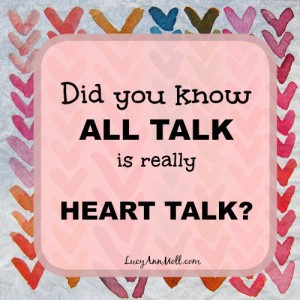 Body language and tone of voice — Isn’t is hard to believe that these are far more important in communicating your feelings and attitudes than your words?
Body language and tone of voice — Isn’t is hard to believe that these are far more important in communicating your feelings and attitudes than your words?
Clear communication matters in every relationship you have. The clearer your communication, the stronger your marriage and your friendships, even your interaction with a Starbucks barista. There are three main parts to any message: your body language (especially facial expression), your tone of voice, and your words.
God values loving and truthful communication. Did you know all talk is really heart talk? Click & Tweet!
“Christ recognized that all talk is heart talk. . . .our words affirm our inner condition,” says Joe Stowell in The Weight of Your Words.
Everything you say — your words, body language, and tone of voice — reveals the desires and motivations of your heart. Your heart is the immaterial part of your being; it is your “control center.” Your beliefs, values, desires, and motivations reside in your heart and are exposed though your words as well as your actions, emotions, and thoughts.
CRAZY FACT: Your words are the least important part of your message! Only 7 percent of your message is verbal. Facial expressions are the most important (55 percent), followed by tone of voice (38 percent). These percentages are based on well-known research by Dr. Albert Mehrabian, professor emeritus, UCLA.
In this article, you’ll get two important insights
- Why body language is super important.
- How to give a clear message.

Why Body Language Is Super Important
Body language is visual. It is the most important part of interpersonal communication. A person’s eyes are especially important. Read more about the eyes. Some examples of body language:
- Crossed arms
- Raised eyebrows
- Shoulder shrug
- Pursed lips
- Smirk
- Pointing finger
- Staring
- Lack of eye contact
- Rapid blinking
- Shifting from foot to foot
- Drumming fingers
- Covering mouth with hand
- Smiling
The examples are nearly endless. What would you add to the list?
Two pictures:
A while back I talked with a teenage girl who didn’t want to talk to me. I asked a few easy questions about school and after-school activities, and she answered politely. Her tone of voice was generally friendly, as were her words. How how could I could I tell she wanted to be anyplace but my office? She looked to the side and she looked down, but never made eye contact. I asked her straight-out: Did your parents make you come? “Yes,” she blurted, her eyes on me, finally.
Another time I met with a twenty-something woman who had a story to share. She stammered. She looked down. She twisted a tissue in her hands. Before she said a word, I knew her story was difficult and painful.
One reason I prefer to meet with counselees in person or by Skype is to see their nonverbal communication. Some biblical counselors call it “halo data” — vital information you see and even hear, such as a sigh or a clearing of the throat. It gives important information so that — in Christ’s strength — I can counsel well.
If I didn’t see my counselee’s body language, I’d have an incomplete message.
How to Give a Clear Message
Have you played the game “Match the Pair”? Cards are placed faced down, and you turn over two at a time. When you get a matching pair, you get a point. You use visual cues alone to try to win the most pairs.
In regular communication, body language and tone of voice matter greatly, as you know. To give — and receive — a clear message, you need to match up all three parts of communication: body language, tone of voice, and words.
Mary Kassian says in Conversation Peace, “All three parts of the message must align and be consistent to the for the message to be believed.” For example, if you use friendly words, but your brow is furrowed and your voice sounds snarky, then your message will be disregarded. Your communication confuses more than it helps.
To give a clear message, be sure to match up the three parts of a message. Click & Tweet!Think of a recent time you experienced a communication mishap. Did your tone of voice match your words? How about your facial expressions and body language? Did they line up with your verbals?

With your mouth, you can tell the truth or lie, encourage or complain, boast or speak humbly. What you say reveals what’s going on inside the deep part of you.
Would you like to start saying what you mean and improve your relationships with others and with God? Contact me to set up a time for a free 15-minute phone consult. May you continue to experience God’s smile on you.
Sharing hope with your heart,



